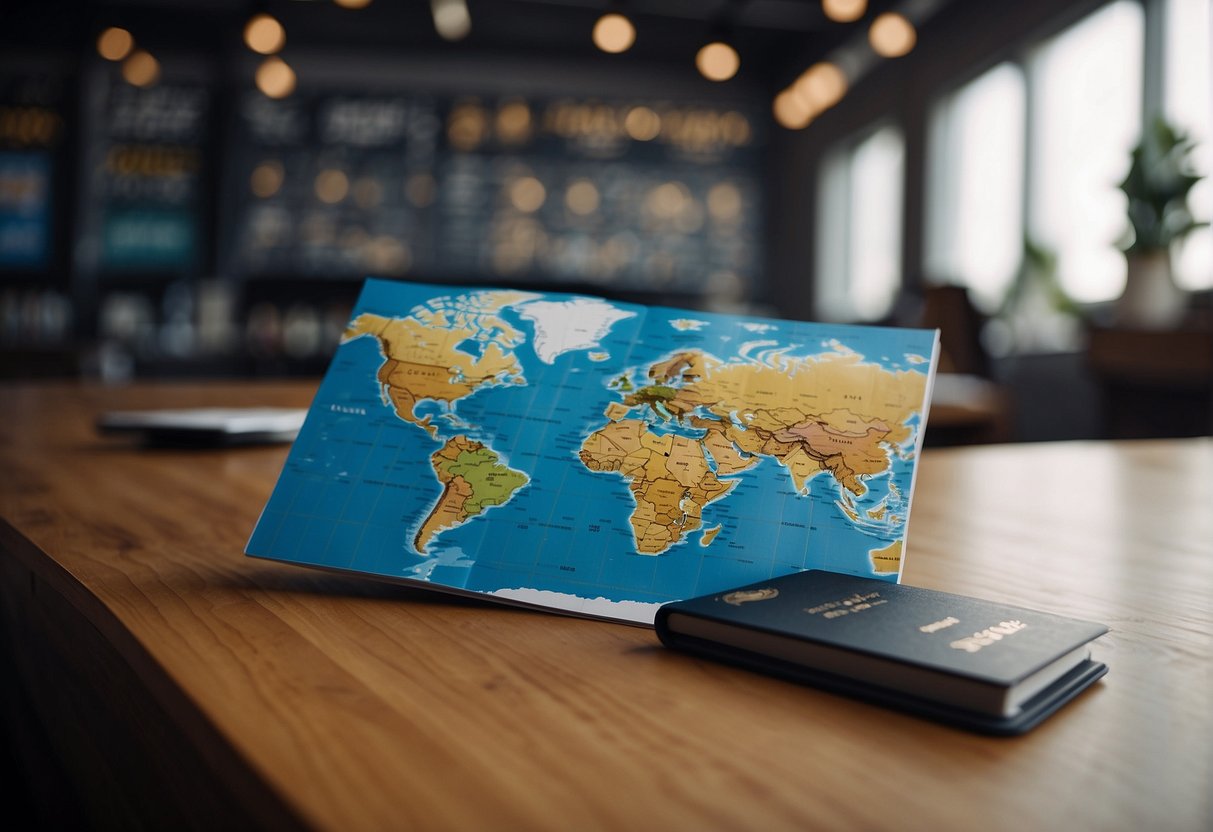Embarking on a career in international travel presents an array of unique opportunities and challenges. Such careers encompass a broad spectrum of roles, including those where travel is the core element of the job, like airline pilots or travel guides, and positions that require travel as a means to fulfill global business needs, such as international sales managers or consultants. These professions not only cater to those with a passion for exploration and cross-cultural engagement but also provide a platform for growth in a dynamic and ever-evolving industry.

Working in the international travel sector often involves adapting to different cultures, managing logistics across time zones, and staying abreast of global trends and regulations. The flexibility offered by remote work and the rise of digital nomadism has further diversified the range of careers in this field. While these positions can offer exciting experiences and the opportunity to see the world, they may also come with unique working conditions that require a high level of adaptability and problem-solving skills. Moreover, the benefits and compensation for these roles can vary greatly, making it essential for candidates to thoroughly research and navigate job opportunities.
Key Takeaways
- International travel careers offer diverse roles with opportunities for exploration and professional growth.
- Adapting to various cultures and working conditions is essential in the international travel industry.
- Candidates must consider benefits, compensation, and the dynamic nature of travel careers when pursuing opportunities.
Understanding International Travel Careers
International travel careers offer individuals the chance to explore the world while earning a living. These careers range from creative roles like a freelance photographer to business-oriented positions that enhance global commerce.
The Travel Industry Landscape
The travel industry encompasses a broad spectrum of careers that crucially pivot on mobility and the global marketplace. Professionals might find themselves capturing stunning landscapes as freelance photographers, where the national average salary hovers around $19,088 per year. They enjoy the autonomy to travel for assignments whenever they choose. Jobs like airline pilots, flight attendants, geoscientists, or travel nurses also fall under this category, each with a unique set of responsibilities and rewards. These roles can require varying levels of interaction with passengers or clients, and routinely necessitate international travel as a fundamental aspect of the job.
Essential Skills and Qualifications
To thrive in international travel careers, individuals often need a blend of specific qualifications and soft skills:
- Qualifications: For many travel jobs, specialized training or certification is required. For instance, flight attendants undergo rigorous safety training, while travel nurses must be licensed in their field.
- Skills: Adaptability, cultural sensitivity, and strong communication skills are essential. Professionals should also be highly organized and possess a level of comfort with frequent changes and unpredictable schedules.
Travel industry careers exemplify personal growth and offer unforgettable experiences. The blend of qualifications and skills ensures not only financial stability but also a potentially satisfying work-life balance.
Career Opportunities in Travel
The travel industry presents a diverse range of career opportunities for individuals with varying skills and interests. These roles span the globe and offer the chance to engage with different cultures and environments.
Travel and Tourism Jobs
Tour guides play a pivotal role in the travel and tourism sector, offering in-depth local knowledge and insights into a destination’s history and culture. Travel agents also form the backbone of this industry, assisting clients with itinerary planning and providing travel advice to ensure memorable experiences.
Aviation and Transportation Careers
Flight attendants offer essential services, focusing on passenger safety and comfort during air travel. They possess strong interpersonal skills and are trained to respond to in-flight emergencies. Careers in aviation extend beyond the cabin, including transportation logistics and air traffic management.
Hospitality and Service Roles
Hospitality careers cater to the service aspect of travel, with positions like bartenders enhancing guests’ enjoyment through expert drinks service. Customer satisfaction is paramount, and the hospitality industry seeks individuals who can deliver exceptional experiences consistently.
Education and Community-Based Positions
Teachers who travel and work abroad offer a valuable contribution to educational development, often serving as au pairs, where they live with a host family and assist with childcare, while teaching the family’s children a new language or other skills.
Adventure and Specialty Occupations
Scuba diving instructors enable adventurers to explore underwater worlds while ensuring safety and imparting technical diving knowledge. They often work in exotic locations, turning their passion for marine life and the environment into a rewarding career.
Remote Work and Digital Nomadism
The intersection of remote work and digital nomadism offers professionals the freedom to explore the world while maintaining their careers. This section delves into how individuals can leverage online opportunities to become successful digital nomads and highlights specific career paths that exemplify this modern approach to work and life.
Online Careers in Travel
Individuals seeking to combine their profession with their passion for travel have a myriad of online careers to choose from. Teaching English online has become a popular option for many digital nomads, as it offers flexible hours and the ability to work from virtually anywhere. Websites such as Remote.co suggest a range of digital nomad jobs, from art and creative positions to more traditional roles that have adapted to the remote work model.
- Teach English Online: A lucrative role for those proficient in the language, requiring minimal setup beyond a stable internet connection.
- Remote Marketing and Sales: Professionals can manage campaigns or drive sales while embracing a nomadic lifestyle.
- Travel Planning: A service in high demand, especially for those with firsthand travel experience.
Blogging and Influencer Marketing
Blogging and influencer marketing are two prominent avenues for digital nomads to monetize their travel experiences. A travel blog can not only serve as a platform to share personal journeys but also as a means to earn income through affiliate marketing, sponsored content, and partnerships. Similarly, influencers leverage social media to promote brands and destinations, often receiving compensation or free travel in exchange for their endorsement.
- Travel Blogging: Offers the chance to build a personal brand while providing valuable content and travel tips.
- Influencer Collaborations: Engaging with brands for sponsored content can provide a steady stream of revenue while traveling.
Working Conditions and Environment

International travel careers offer varied working conditions and environments that can impact one’s performance and job satisfaction. They often involve exposure to different cultures, values, and workplace practices. The following subsections will discuss key aspects of these conditions, including workplace diversity, health and safety issues, and work-life balance.
Workplace Diversity
In the realm of international travel careers, workplace diversity is noteworthy. Employees often find themselves collaborating with colleagues of different nationalities, ethnic backgrounds, and languages which enhances the work environment. This diversity enriches the job experience by bringing together a wide range of perspectives and skills.
- Values: Embracing diverse values and customs.
- Performance: Diverse teams may drive creativity and innovation.
Health and Safety Issues
Health and safety are paramount in any job, but they take on additional significance in international travel careers. Workers are often provided with health insurance, dental insurance, and sometimes even life insurance to safeguard their well-being while abroad.
- Safety: Employers must adhere to stringent safety regulations to protect staff.
- Health Insurance: Comprehensive coverage is critical for overseas assignments.
Work-Life Balance
Achieving a healthy work-life balance can be a challenge in the demanding field of international travel careers. However, it is of utmost importance for maintaining one’s health and job performance.
- Work Hours: Trends show a decrease in average work hours, contributing to personal satisfaction.
- Retirement Plan: Planning for the future is essential, with many employers offering retirement plans as part of the job package.
Benefits and Compensation

When exploring careers in international travel, one will find a variety of benefits and compensation that can enhance job satisfaction and provide security. These often include comprehensive insurance packages, retirement savings plans, and ample time for family and vacation.
Insurance and Health Benefits
Full-time employees in international travel careers typically have access to substantial insurance and health benefits. These benefits often extend beyond basic health coverage, including dental and vision insurance. For employees who are frequently overseas, international health insurance ensures coverage in multiple countries.
Savings and Retirement Plans
Savings and retirement plans form a critical part of an international traveler’s compensation package. Employers may offer 401(k) plans, sometimes with matching contributions, encouraging employees to save for their future. These plans are a key benefit for employees looking to secure their financial wellbeing post-retirement.
Family and Vacation Time
Balancing work and leisure is key in international travel roles, and the industry often promotes this through generous family and vacation time. It’s not uncommon for full-time employees to enjoy schedules that adhere to Monday to Friday itineraries, allowing for personal time and extended weekends to spend with loved ones or on leisure travel.
Navigating Job Opportunities
In the realm of international travel careers, one must be strategic in their approach to uncovering job opportunities. Applying targeted strategies, leveraging professional networks, and understanding career progression are essential steps in building a successful global career.
Job Search Strategies
When seeking international job opportunities, aspirants should explore a variety of platforms and services. Job search engines such as Indeed offer a plethora of positions ranging from entry-level to executive roles. Candidates should also consider participating in programs designed for international careers, which can provide insider knowledge and access to unadvertised positions. It’s crucial to tailor resumes and cover letters for each application to stand out in a competitive market.
Building a Professional Network
Networking is a powerful tool in discovering opportunities for travel-centric careers. Individuals should engage with communities both online and offline, such as LinkedIn or travel-specific gatherings, to increase visibility and connect with industry professionals. Developing relationships can lead to recommendations and introductions to hiring managers. Furthermore, offering to make a difference through volunteer work or pro-bono services within these networks can showcase one’s skills and dedication.
Career Progression
Advancing in an international travel career often requires a balance between gaining experience and seizing the right opportunities. Professionals should regularly seek feedback and continue learning to enhance their credentials. Full-time employment in the field provides a stable platform for growth, but individuals should also remain open to temporary assignments or project-based work, which can offer fast-tracked development and exposure to diverse cultures and environments.
Specialized International Travel Careers
Specialized international travel careers offer unique opportunities for professionals to work globally, often requiring specific skills, qualifications, and the willingness to adapt to different cultures and environments.
Aid and Development Positions
Professionals in aid and development positions, such as international aid workers or Peace Corps volunteers play a crucial role in humanitarian efforts around the world. These positions typically require a strong commitment to service, adaptability, and sometimes specialized knowledge in areas like health, education, or agriculture.
-
International Aid Worker: Generally employed by non-governmental organizations (NGOs) like Doctors Without Borders, these individuals provide support in areas affected by natural disasters or conflict.
-
Peace Corps Volunteer: A government-run program that places volunteers in overseas communities to work on projects in education, health, and economic development.
These careers often demand a person to be licensed in specific fields, especially when serving as consultants, or when working in health-related positions such as a travel nurse.
Artistic and Creative Professions
The realm of artistic and creative professions encompasses various roles where travel can be a significant part of one’s career. This includes occupations like actors, muralists, and even specialized roles like massage therapists who may work on cruise ships or in luxury hotels abroad.
-
Actor: Traveling for shoots, performances, and tours, actors often work in an array of international settings, needing versatility and cultural sensitivity.
-
Muralist: These artists undertake commissions that can see them painting large-scale works in different countries and contexts, collaborating closely with local communities or businesses.
Industrial engineers often travel to oversee operations or consult on large-scale projects in multinationale corporations, while other kinds of engineers might find themselves working on-site for international infrastructure projects.
In these careers, professionals are not only advancing their artistic or technical abilities but are also ambassadors of their craft on the international stage.
Laws and Regulations
Navigating the complex web of laws and regulations is crucial for careers involving international travel. Understanding visa requirements, employment law, and taxation is essential for those seeking to work abroad legally and effectively.
Visas and Work Permits
Securing the correct visa or work permit is a mandatory step for anyone looking to work in a foreign country. Each nation has its own set of visa categories, which can include tourist visas, business visas, and student visas, among others. Commercial businesses must ensure that their employees acquire the proper work permits, which often requires the sponsorship of the hiring company. Employers need to be guaranteed that their workers are legally authorized to work to avoid penalties.
- Tourist Visa: Typically does not permit employment.
- Business Visa: May allow for short-term commercial activities but not employment.
- Work Permit: Required for long-term employment; often issued with employer sponsorship.
International Employment Law
International employment law encompasses the rights, restrictions, and obligations of employers and employees operating across international borders. Those employed internationally must be aware of the varying labor laws that apply, which can differ significantly from their home country’s regulations. For instance, working hours, minimum wage, and termination policies can vary. It is advisable to consult with a licensed legal professional who specializes in international employment law to ensure full compliance with local legislation.
- Key Elements:
- Working hours
- Minimum wage standards
- Termination procedures
Taxation for Expatriates
Expatriates must remain cognizant of their tax obligations in both their home country and the country where they are working. Many countries have tax treaties to prevent double taxation, but individuals might still be subject to local taxes on their income. A critical aspect for expatriates is to determine their status as a resident or non-resident for tax purposes, which impacts their tax liability. Moreover, taxation for expatriates is not merely about income tax; it also involves potential estate and gift taxes which need careful preparation.
- Tax Considerations:
- Determine residency status for taxation.
- Understand tax treaties to avoid double taxation.
- Be aware of potential estate and gift taxes.
Global Trends in Travel Careers
In the travel industry, recent years have marked a transition toward diverse job opportunities influenced by emerging markets, technological advancements, and a growing dedication to sustainable practices. Careers in this sector are evolving to meet the needs of modern-day travelers who seek adventure, personalized services, and responsible tourism.
Emerging Markets
Emerging markets, such as Southeast Asia and Africa, present significant growth opportunities for travel careers. These regions have seen an increase in the development of travel jobs, particularly those connected with nature and culture-focused travel, such as safari guides. Operators in these markets look for professionals who can blend local insights with international service standards to create unforgettable experiences for tourists.
Technology and Innovation in Travel
Technology and innovation play pivotal roles in shaping travel careers. The integration of digital tools has led to the creation of jobs centered around enhancing travel experiences through innovative services. For example, travel apps require IT professionals for development, and online platforms need customer support agents adept at navigating these technologies. Advanced data analytics also aid companies in personalizing travel adventures, making careers in this space both dynamic and tech-centered.
Sustainability and Responsible Tourism
The importance of sustainability and responsible tourism is driving demand for professionals who can implement eco-friendly practices. Travel companies prioritize the hiring of individuals who can manage sustainable initiatives and communicate the necessity of conservation to travelers. This sector values roles, such as eco-tour guides and sustainability managers, who can promote and oversee responsible tourism activities ensuring that local communities and environments are respected and preserved.
Professional Development and Education
Within the realm of careers that involve international travel, professional development and education are paramount for maintaining competitiveness and career progression. They provide the foundation for acquiring the necessary skills and certifications that a travel-oriented profession demands.
Continuing Education
Continuing education is an essential component for professionals such as travel nurses and teachers who seek international opportunities. Programs specifically designed for these careers often include cultural competency training, language acquisition courses, and strategies for effective communication in diverse environments. For instance, teachers aiming to work abroad may pursue advanced degrees in international education or consider enrichment courses that focus on teaching English as a foreign language.
Certifications and Licenses
Obtaining certifications and licenses is a critical step for many travel-centric careers. Engineers, for example, may need to secure professional engineer (PE) credentials to work on international projects, which may involve local regulations and international codes. Conversely, travel nurses must have the appropriate licensed qualifications and possibly additional certifications like the Certified Registered Nurse Infusion (CRNI) to practice in various countries. These professional credentials not only facilitate legal work status but also demonstrate a commitment to high standards and expertise in one’s field.
Long-Term Career Planning

When considering a career that entails international travel, one must meticulously strategize for the long term. Full-time travel jobs come with unique challenges and benefits, thus requiring thoughtful planning.
Key Considerations:
-
Career Growth: Look for job opportunities that offer clear advancement paths. As one gains experience, they should ensure these roles can lead to higher positions, potentially with increased travel perks and responsibilities.
-
Benefits Package: It’s crucial to examine the benefits package. For those who are globetrotting, health insurance with international coverage is a must. Additionally, scrutinize other benefits like paid time off and wellness programs.
-
Retirement Planning: Not all travel jobs come with a robust retirement plan. Research companies that contribute to a 401(k) or offer pension plans, as these are critical for long-term financial security.
-
Job Security: The longevity of the career can also be of concern. One should look for industries known for stable job opportunities that are less likely to be affected by economic downturns.
| Criteria | Why It Matters |
|---|---|
| Career Progression | Ensures continued growth and professional development |
| Comprehensive Benefits | Vital for health, well-being, and work-life balance |
| Retirement Solutions | Secures financial future beyond working years |
| Employment Stability | Provides peace of mind and continuity |
Those considering a career combining travel and long-term stability should approach their job search with these factors in mind to ensure a fulfilling and sustainable professional life.
Frequently Asked Questions
This section addresses common inquiries regarding careers with a focus on international travel, providing insight into various professions and qualifications needed.
What are some high-paying careers that involve frequent international travel?
Pilots and business consultants are among the professions that often require international travel and generally offer high salaries. For instance, pilots can earn an income in the range of $150,000 to $240,000 per year.
How can one find entry-level jobs that include international travel?
Entry-level jobs that include international travel can often be found in fields like teaching English abroad, where a TEFL certificate can be a key qualification for non-native English-speaking countries. Opportunities can also be sourced from job boards and companies that operate globally.
What are the best career paths for individuals seeking to travel internationally as part of their job?
Career paths such as digital nomadism, working on cruise ships, or becoming a flight attendant are well-suited for those seeking to incorporate travel into their profession. These roles offer the chance to explore the world while working.
Are there specific jobs that offer opportunities to travel the world while getting paid?
Yes, jobs like travel nursing, airline employment, and roles in the travel industry provide the opportunity to travel internationally while earning an income.
Which professions are known for offering the most travel opportunities for women?
Professions such as international NGO work, travel journalism, and tourism management are known for offering substantial travel opportunities to women. These careers often require mobility and provide the chance to experience diverse cultures and locations.
What qualifications are necessary for securing a job that involves extensive travel?
Qualifications can vary widely depending on the job; however, language skills, professional certifications relevant to the field, and a willingness to adapt to different environments are typically essential for jobs involving extensive travel. For some roles, a university degree or specialized training such as a pilot’s license may be required.
Leave a Reply